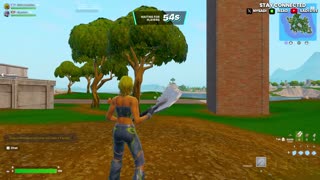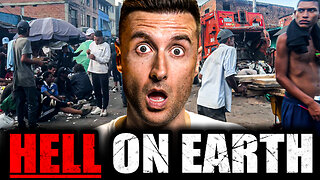Premium Only Content

Israel Tried to Stop the Flotilla — And Triggered a New One Instead
Right, so you’d think after hijacking forty-odd aid vessels, detaining nearly five hundred civilians, and striking two of these ships in a Tunisian harbour before they got anywhere near Gaza, Israel would be chalking up another win. Instead, they’ve been forced to look up and find that another flotilla is already on the way. Eleven new vessels, more activists, and the same inconvenient cargo — food, medicine, baby milk, and morality. That’s the thing about siege logic: it always backfires. The more Israel tries to blockade Gaza, the more it blockades itself. Every drone strike and arrest has become a PR own goal, every seizure another proof that this “security” state is terrified of cameras and conscience alike. You can board a boat, sure. But you can’t confiscate decency.
Right, so, just days after Israel’s navy seized forty-two civilian boats in international waters—boats loaded not with soldiers but with sacks of flour, cartons of insulin, wheelchairs, baby formula and hope—the horizon fills once again with the sight of more civilian vessels. Eleven this time, fewer than before but heavier with meaning. Doctors, journalists, students, and trade-unionists from twenty-five countries have climbed aboard and pointed their bows toward Gaza. It was the answer to a question Israel never stops asking the world: how much more cruelty can you witness by our hands before you act? The Global Sumud Flotilla had been dragged in chains to Ashdod. Four hundred and seventy activists were detained. Yet the idea they carried cannot be stopped, will not be broken, more will come.
From the ports of Italy and Spain the new flotilla sailed, past Crete and into the eastern Mediterranean. Eleven vessels—among them the Al-Dameer, Arabic for “Conscience,” sixty-eight metres long and crowded with medical workers and reporters, the very same vessel that Israel struck off the coast of Malta back in May, all fixed up now; the Ghassan Kanafani, named for the assassinated Palestinian novelist; and the Al-Awda, “The Return,” resurrected from earlier missions. Cameras, satellite transmitters, and a collective insistence that Gaza is not a crime scene to be cordoned off forever drive them on. The International Committee to Break the Gaza Blockade announced the departure; it was confirmed the convoy’s position north of Egypt’s Marsa Matrouh.
But of course they sail through the wake of a scandal that still reeks. Only weeks earlier, two of the Sumud flotilla vessels docked in Tunisia had been struck by Israeli drones you might recall. Well there’s been some developments on that. Where Tunisian authorities initially denied any notion of Israeli interference, it has now been confirmed that Benjamin Netanyahu personally approved that operation. Other nations borders, other nations security means nothing to Israel, but God forbid you impugn theirs. Drones apparently launched from a submarine and dropped incendiary charges onto the decks at Sidi Bou Said, damaging boats flying European flags. No deaths, just a demonstration: Israel can reach anywhere, and law will not reach back. But it did not intimidate; it multiplied defiance. Tunisian activists who had helped outfit those ships formed what they called the Maghreb Fleet of Steadfastness and joined the main Sumud Flotilla. They like the other vessels and crews have been kidnapped at sea, they have now begun a hunger strike in Israeli prison, turning their bodies into a continuation of their voyage.
Inside Israel however, matters have turned darker and stranger. National Security Minister Itamar Ben Gvir—the man who built a career idolising a terrorist who massacred Muslims in Hebron—arrived at the Ashdod detention compound with a camera crew. He jeered at the seated detainees, calling them terrorists and laughing as soldiers watched. “They should smell the suites where the terrorist prisoners are kept,” he said later, demanding they be jailed for months instead of deported. The phrase was grotesque, but then so is he. It was also useful. It told the truth about the government’s psyche: cruelty not as accident, but as policy. Netanyahu overruled him and ordered swift deportations though, preferring optics to vengeance. Yet both men served the same purpose—one performing rage for his base, the other laundering it for diplomacy. And that, in miniature, is Israel’s wider collapse. The siege at sea mirrors the siege within: a government devouring itself, its ministers fighting not for policy but for spectacle. When a state needs theatrics to disguise its fear, it has already begun to lose control of its story.
The Sumud Flotilla itself ended in the way Israel’s defenders now call routine. Commandos boarded the final boat, the Marinette, about forty-two miles from Gaza’s shore, so one more act of piracy in international waters. They pointed rifles at unarmed passengers, seized cameras, cut radio lines, and towed the ship to port. But the footage leaked anyway. You can confiscate equipment, but not memory. The world saw gunboats hunting humanitarians, and for the most part have been sickened by it. One of the most heavily armed navies on earth chasing a cargo of milk powder. The longer the images circulated, the more Israel’s deterrence cracked. What kind of siege depends on suppressing flour? What kind of democracy sends soldiers to abduct surgeons? Though of course that’s hardly been unique to the flotilla.
While the commandos were busy performing self-defence for the cameras, Gaza got an unexpected and very welcome opportunity. If the aid can’t reach them, perhaps the distraction presented itself with an opportunity. You see as the navy redeployed to intercept the flotilla, fishermen were able to reach the sea for the first time in months and they filled their nets. They caught sardines, not symbolism. Families grilled them on open fires. The flotilla fed families after all from a certain point of view. That detail mattered more than any press release. It proved that the siege is not a wall of necessity but a switch that can be flipped. When the oppressor looks away, the oppressed live. Israel calls this security; reality calls it starvation management. But in chasing aid boats, Israel lost control, lost their grip and Palestinians seized their chance.
The hunger strikes were not solely confined to the Tunisian contingent of the flotilla though. Greeks, an Irish academic, and several doctors have also refused food. They issued statements through lawyers accusing Israel of piracy and arbitrary detention. In Tunisia, thousands marched on the foreign ministry demanding their release. In Greece, families stood outside embassies holding photos of their loved ones. In Italy, the response turned industrial: dockworkers declared a nationwide strike. Two million people joined demonstrations across a hundred cities, halting ports, trains, and airports. Giorgia Meloni dismissed it as an “economic tantrum.” The unions called it solidarity. For the first time since the blockade began seventeen years ago, European labour treated Gaza’s captivity as part of its own struggle. The line between humanitarianism and class politics has blurred; it is now all the same fight—against impunity above and deprivation below.
In Colombia, which had already severed diplomatic relations with Israel, the government praised the flotilla publicly. In Pakistan and Bangladesh, rallies filled city squares. The story was no longer about a few boats; it was about the erosion of fear. Each interception, each hunger strike, each image of soldiers barking orders at unarmed medics chipped away at Israel’s façade. You can occupy land; you cannot occupy perception forever no matter how much cash you throw at hasbara. And yet Israel continues to try, throwing drones, diplomats, and disinformation at this rising tide of empathy.
What terrifies Israel’s leadership is that the flotilla is no longer an isolated stunt but a method—a recurring act now of civil disobedience that exposes both the illegality and absurdity of the siege. Every voyage forces a new dilemma. If they let the ships through, the blockade’s fiction of total control evaporates. If they attack them, the moral cost mounts and the cameras roll. Either way, legitimacy bleeds out faster than authority can be asserted. The sea becomes not a buffer zone but a mirror. In that mirror Israel sees its reflection as others do: a power so terrified of scrutiny that it mistakes compassion for conspiracy.
This fear has become policy. The state has expanded the definition of “terrorist” to include anyone who challenges its monopoly on violence or narrative. Journalists documenting war crimes? Terrorists. Medics treating the victims of bombings? Terrorists. European trade-unionists refusing to handle Israeli cargo? Terrorists. All are Hamas. The word has been drained of meaning and filled with convenience. Yet language has a recoil effect. When every opponent is a terrorist, the category eventually engulfs the accuser. Israel is now trapped in its own rhetoric, a democracy that behaves like the caricature of tyranny it once claimed to oppose.
Meanwhile, Netanyahu clings to his balancing act—hawkish enough to satisfy the far right, pragmatic enough to keep foreign aid flowing. But the drone strikes in Tunisia exposed the limits of his stagecraft. Ordering an attack in another sovereign country to destroy unarmed boats was not strategy; it was compulsion and added to the strike on Doha last month, adds to his perceived desperation. It told allies and enemies alike that Israel’s sense of immunity now exceeds its sense of reality. And it forced a quiet panic in Western capitals. How do you defend an ally who bombs humanitarians in someone else’s harbour? How many times can you call lawlessness “self-defence” before the phrase collapses under its own weight? Netanyahu’s government has turned its own siege into a spectacle—and the world is more and more seeing straight through it.
The flotilla’s re-emergence once again now, already, is therefore more than a symbolic gesture; it is a geopolitical test. If Israel attacks again, it risks alienating the few European governments still willing to parrot its talking points. If it refrains, it concedes weakness. For once, activists have engineered a scenario in which moral clarity and strategic leverage coincide. Their courage creates a trap, and the only escape is honesty. That is why the fleet matters even if it never reaches Gaza. It forces the world to watch a government choose, in real time, over and over, between law and lawlessness and they always choose wrong.
Inside the prisons, the hunger strikers keep count of their days. Outside, solidarity campaigns multiply. The effect is cumulative, not spectacular—a slow-moving moral landslide. Israel’s traditional defenders in the media can still suppress one story, but they cannot suppress a pattern. The question that haunted the Mavi Marmara massacre in 2010—how could this happen again?—now has an answer. It keeps happening because the world let it. But this time the world is smaller, more connected, less willing to pretend ignorance. Every intercepted ship now livestreams its own evidence. Every detained journalist files testimony before the signal dies. Every government statement that calls for “restraint on both sides” sounds hollower against that footage of warships surrounding fishing boats.
And then there is Gaza itself, the heart of this endless rerun. Beneath the blockade’s statistics live two million people whose lives are measured in litres of clean water and hours of electricity, and against the daily death tolls. For them, the flotilla is not a spectacle but a heartbeat. News that another ship has set sail means they have not been forgotten. It means someone out there still believes their survival is worth the risk of arrest, or the cost of their own lives. When those boats appear on the horizon, even if they never dock, they break the monotony of siege. In that sense the flotilla’s success is already real; its cargo is morale.
The Israeli government understands this, which is why it reacts with such disproportionate fury. The blockade is a performance as much as a policy. Its purpose is not merely to control Gaza but to display control—to make hopelessness visible. Every act of defiance therefore undermines not the military calculus but the psychological one. If the oppressed begin to believe that the cage can be opened, the warden’s authority erodes. And so the state overreacts, sending commandos after volunteers, ministers after medics, drones after docks. Each overreaction reveals their weakness as they try to project strength.
The international response, slow but cumulative, marks a shift. Ireland, Belgium, Spain, and Norway have all lodged formal protests. The UN Human Rights Office described Israel’s interceptions as a dangerous precedent for humanitarian access. Amnesty International called them deliberate acts of intimidation. Even typically cautious newspapers in Europe have begun to describe the blockade as collective punishment. That language matters. Once something is named, it can be prosecuted. Israel’s diplomats know it, which is why they spend as much time managing vocabulary as borders.
But language, too, is slipping from their grip. The word “flotilla” no longer conjures images of provocation but of persistence. The word “blockade” now evokes cruelty, not discipline. And the word “security,” repeated endlessly by Israeli spokespeople, sounds less like reassurance than addiction. Security from what? From accountability? From empathy? A nation that claims to be threatened by aid boats has already confessed to how weak and petty it truly is.
As the new flotilla advances, the pattern repeats: radar pings, intercept orders, diplomatic warnings. Yet something intangible has shifted. The moral centre of gravity is no longer where Israel believes it to be. The courage of a few hundred civilians has done what decades of negotiations could not—reframe the siege as a universal question of conscience. When governments fail, people act.
And still the deeper questions echo beneath the data. Why does the world tolerate one nation’s right to police international waters? Why is collective punishment still defended as self-defence? Why do Western democracies arm a state that shoots at journalists and starves children? Each new flotilla forces those questions back onto the table. The answers, or the refusal to give them, define not only Israel’s character but theirs too.
There is also the matter of precedent. If Israel can seize civilian vessels in open seas without consequence, any state can. Maritime law begins to rot. The line between order and piracy blurs. What is permitted in the name of one blockade becomes available to all. The world’s silence, therefore, is not neutrality; it is complicity in the corrosion of its own rules.
The flotilla’s endurance proves that empathy, when organised, is stronger than fear. That is why the story matters beyond Palestine. It asks every observer, every bystander, what they would do when faced with an injustice so visible that to look away is an act of participation.
Soon enough, the next confrontation will play out. Warships will shadow the eleven vessels. Commanders will weigh the optics of violence against the illusion of control. Perhaps they will board the ships again, its probably a safe bet. Perhaps they will tow them into Ashdod and stage another victory. But every victory like that is hollow. The blockade survives materially even as it collapses morally. Each act of suppression enlarges the audience that no longer believes the script. The world is learning to see through the performance.
In the end, what remains is not the outcome of any single voyage but the accumulation of defiance. The flotilla sails because silence is worse. It sails because legality without morality is merely procedure. It sails because even a failed attempt to reach Gaza succeeds in exposing the absurdity of those who claim ownership of the sea.
History will not remember the serial numbers of the gunboats or the bureaucrats who signed the seizure orders. It will remember the moment ordinary people decided to test the horizon. It will remember that when governments looked away, citizens steered into the storm. It will remember that freedom is not granted but insisted upon. And it will remember that on a planet where borders are enforced by drones, a handful of boats dared to prove that conscience still floats.
The siege will end, though no one can yet say how. Perhaps through diplomacy, perhaps through collapse, perhaps simply because cruelty exhausts itself. However it happens, when it happens, historians will trace its undoing back not to speeches in parliaments but to small, stubborn acts of navigation. To the day Gaza’s fishermen hauled in their first catch in months. To the night medics and journalists who set sail knowing they might not return. To the hunger strikers who turned captivity into protest. To the moment the blockade wobbled and the world saw it happen. The question now is not whether the siege will fall, but how many times Israel will destroy its own credibility before it does.
And when that reckoning comes, those who stood by will claim they didn’t know, as they always do. But they did know. They saw the ships. They saw the drones. They saw the mockery and the hunger and the courage. They saw a nation so frightened of empathy that it fired at aid. And they saw the opposite too: a handful of people who refused to stand aside like they did.
Plenty of people who did not sail to Gaza are acting in defiance too, as the mockery of Giorgia Meloni of Italy is now biting her firmly on the backside, with national strikes sweeping the nation. Get all the details of Italian solidarity and karma for their fascistic government in this video recommendation here as your suggested next watch.
Please do also hit like, share and subscribe if you haven’t done so already so as to ensure you don’t miss out on all new daily content as well as spreading the word and helping to support the channel at the same time which is very much appreciated, holding power to account for ordinary working class people and I will hopefully catch you on the next vid. Cheers folks.
-
 1:18:46
1:18:46
Steve-O's Wild Ride! Podcast
3 days agoJacoby Shaddix Breaks Down Papa Roach Longevity | Wild Ride #269
8291 -
 LIVE
LIVE
NYSadi
21 minutes agoFIRST PARTNERED RUMBLE STREAM 💚 UNREAL RANKED WITH THE BROS 💚 TUNE IN
52 watching -
 17:42
17:42
Nate The Lawyer
1 day ago $0.51 earnedHow A Criminal Illegal Alien Scammed His Way Into A $300k Government Job.
8645 -
 28:46
28:46
DeVory Darkins
12 hours ago $9.31 earnedPritzker HUMILIATED after brutal fact check as Democrat candidate calls for political assassination
8.34K84 -
 19:54
19:54
Forrest Galante
9 hours agoPrivate Tour Of America's Best Marine Animal Facility
22.6K7 -
 9:25
9:25
MattMorseTV
1 day ago $15.87 earnedSupreme Court just DROPPED a NUKE.
19.1K65 -
 13:25
13:25
Nikko Ortiz
1 day agoWorst Karen TikTok Fails
21.5K10 -
 40:24
40:24
The Connect: With Johnny Mitchell
2 days ago $20.74 earnedInside The WORST Drug-Infested Slums Of Medellin, Colombia
62.7K29 -
 4:14
4:14
GritsGG
16 hours ago2 Warzone Easter Eggs! How to Find Them EASILY!
16K1 -
 LIVE
LIVE
Lofi Girl
2 years agoSynthwave Radio 🌌 - beats to chill/game to
382 watching
